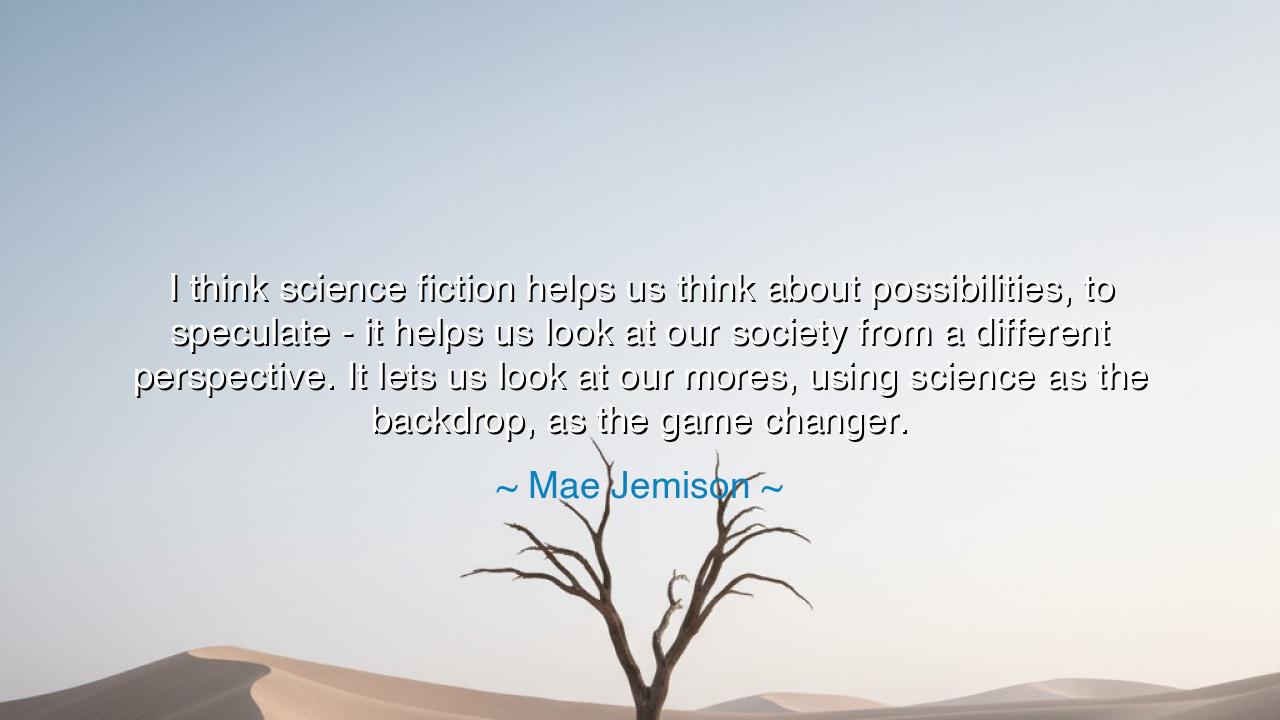
I think science fiction helps us think about possibilities, to
I think science fiction helps us think about possibilities, to speculate - it helps us look at our society from a different perspective. It lets us look at our mores, using science as the backdrop, as the game changer.






Hear, O Seekers of Wisdom, the words of Mae Jemison, who speaks not just of science fiction but of its power to shape our understanding of the world. "I think science fiction helps us think about possibilities, to speculate - it helps us look at our society from a different perspective. It lets us look at our mores, using science as the backdrop, as the game changer." In these words, Jemison reveals the transformative power of science fiction—a genre that does not merely entertain, but offers us a mirror through which we can examine our society, our values, and our beliefs. Science fiction allows us to speculate about the future, to dream of what could be, and in doing so, it helps us challenge the assumptions that shape our present. Through the lens of science, it offers new perspectives on the world we live in, acting as a game changer for how we view our place in the cosmos.
Consider, O Seekers, the ancient philosophers who used the art of speculation to challenge the established norms of their time. Plato, in his Republic, imagined a world where the structure of society could be radically transformed, where justice and wisdom guided the rulers, not wealth or power. His allegory of the cave invites us to look beyond the shadows on the wall, to imagine a world of deeper truth and greater understanding. In the same way, science fiction invites us to speculate, to imagine alternate realities where the social structures we take for granted can be redefined by the possibilities of science, technology, and innovation. It is a genre that forces us to look beyond the boundaries of what we know and see the world from new angles, offering us a vision of what could be rather than being trapped by the limitations of what is.
In the same way, Jemison speaks to the power of science fiction to act as a backdrop for examining the mores—the customs, values, and social norms—that define our society. Consider, O Seekers, the work of H.G. Wells, who in his novel The War of the Worlds explored the themes of imperialism and humanity’s place in the universe. In Wells’ story, the invading Martians symbolize the fear and arrogance of human imperialism, while also forcing us to confront the idea that we, too, might one day face an alien force. This shift in perspective is precisely what Jemison speaks of—a way of using science fiction as a tool to critically examine the mores of our society. Through the lens of science fiction, we can reimagine the power structures, the roles of race, gender, and social class, and the values that shape our world.
Just as Jemison uses science fiction to open new doors of possibility, so did Isaac Asimov with his writings. Asimov’s works, particularly the Foundation series, explored the idea of human civilization on a galactic scale, posing questions about the nature of progress, the role of knowledge, and the consequences of power. In his universe, science and rational thought are the keys to shaping the future, and the exploration of human behavior is the cornerstone of understanding how societies rise and fall. In the same spirit, science fiction becomes a tool of transformation, showing us the vast potential of human ingenuity, while also laying bare the fragility of the systems we have built. It forces us to ask questions about where we are headed, how we treat one another, and what the future might look like if we do not change our ways.
O Seekers, through science fiction, we are called not just to dream of futuristic technology or to imagine alien worlds, but to confront the deeper questions of humanity. The beauty of the genre is that it offers both entertainment and reflection—a place where ideas and imagination can collide, creating new pathways for thinking about our present world. Just as Jemison saw the Apollo missions as a pivotal moment that shaped her own desire for exploration, so too does science fiction open the door to the future, urging us to think about what humanity’s destiny might be. It is not merely about predicting the future, but about shaping it—by envisioning the consequences of our actions and understanding the power of the choices we make.
The lesson, O Seekers, is that science fiction is not just about what happens in outer space or in distant futures. It is a genre that invites us to question the status quo, to challenge the mores of our time, and to reimagine the world we live in. Jemison’s words remind us that science fiction offers a new perspective—one that can be both inspiring and transformative, urging us to look at the world from angles we might never have considered. Through its visionary power, it can reveal truths about our society that are often hidden, and help us shape a future that is more just, more equitable, and more aligned with the true potential of humanity.
So, go forth, O Seekers, with the understanding that science fiction is more than a window into fantasy. It is a mirror through which we can see ourselves as we truly are, and as we might become. Use it to challenge the limitations of the present, to imagine new possibilities, and to find the courage to shape the future with the knowledge that we are the architects of the world we create. Science fiction is the canvas, and we, the dreamers, are the painters. Let it inspire you to look beyond what is and dream of what could be.






AAdministratorAdministrator
Welcome, honored guests. Please leave a comment, we will respond soon